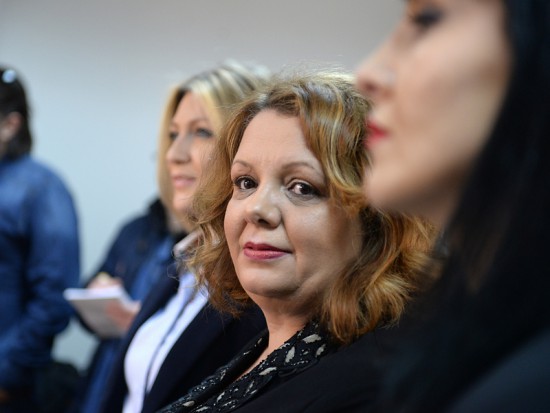Macedonia Special Prosecution Pledges to Continue Probes
As it awaits a resolution of its status and of ability to press fresh charges, Macedonia’s Special Prosecution, SJO, says it will not abandon the task of probing some 100 possible cases of high-level crime.
Macedonia’s Special Prosecution Katica Janeva
Although the deadline for the SJO to press charges expired in June, chief prosecutor Katica Janeva says her office is still working on about 100 pre-investigative procedures into possible crimes. She insisted that they have found an interim solution for the current problem about raising charges. “We are working only on pre-investigative procedures and will open investigations. If a moment comes for those investigations to be turned into concrete charges, we hope to hand them to our colleagues from the [regular] Organized Crime Prosecution and other prosecution offices,” Janeva said.
Much now depends on how politicians resolve the SJO’s status, and whether they merge it into the regular State Prosecution as a separate autonomous sector, or lift the ban on it pressing new charges, by a vote in parliament. The SJO was formed in 2015 as part of an internationally sponsored political agreement and tasked with investigating allegations of high-level crime that arose from illegal wiretaps revealed that year by the then opposition Social Democrats.
It was formed after the regular prosecution failed to seriously investigate the allegations, which mostly concerned top officials from the now ousted right-wing VMRO DPMNE party. However, as part of the deal, the SJO was given only an 18-month deadline to press charges, which expired this June. Until then, the SJO pressed charges in 20 high-profile cases. Its ongoing investigations, however, are not subject to the same deadline.
After the change in power in May, with the election of a new Social Democrat-led government, hopes rose that it would strengthen SJO’s role, as it promised to do earlier. One possible way being considered is by making the SJO part of the regular prosecution, which is currently awaiting the election of a new, presumably more politically independent, Chief Prosecutor. However, Macedonia’s former prime minister, VMRO DPMNE chief Nikola Gruevski, insists that the current SJO probes into new possible cases are illegal.
“I told them that what they are doing is illegal, that their mandate expired long ago and that these pre-investigative procedures are practically harassing citizens, in a situation when they cannot raise charges,” Gruevski said last week as he exited the SJO where he had been summoned as a witness in one of the probes.
Most legal experts says the probes must continue for the sake of the rule of law and to restore faith in the legal system.
Miralem Asani, deputy head of the Prosecutor’s Council, a regulatory body, told Telma TV that the SJO should focus on those probes it already launched prior to the June deadline. “Regarding those cases where the SJO has not yet taken any steps, they should be handed over to the regular organized crime prosecution,” he said.
The organized crime prosecution, which is part of the regular State Prosecution, in past years received negative assessments in EU and US reports on the country, mostly for its inactivity and presumed susceptibility to political influence.
However, on Tuesday, under prolonged pressure from the public, it pressed charges against 36 persons, including former senior police chiefs and six VMRO DPMNE MPs for alleged involvement in the April 27 storming of parliament, which saw some 100 people injured.
30 November 2017
Disclaimer: All views, opinions and accounts included in the RAI News Section are those of the authors; their inclusion does not imply official endorsement or acceptance by RAI. The News Section reflects the selection of topics of informative value to the organization and its stakeholders. Its content is taken from press/media sources and does not in any way reflect official RAI Secretariat policy. RAI Secretariat is not responsible for possible inaccuracies in media reports.

